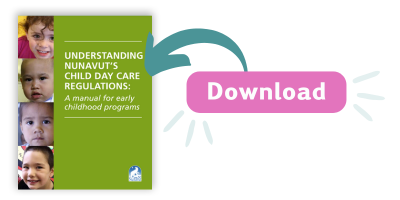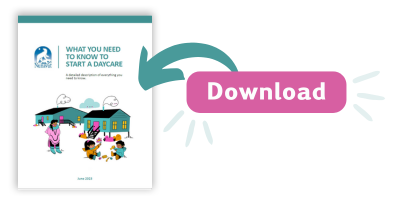Centre Licensing
All Nunavut-based non-profit organizations in good legal standing with Nunavut Legal Registries can apply for funding to start or maintain a licensed childcare facility.
The Department of Education licenses community early childhood facilities under the Child Day Care Act, providing start-up and annual operations funding to non-profit licensed child care facilities and family day homes.
 Regional offices administer applications and act as liaisons between non-profit organizations and the division of Early Childhood Education.
Regional offices administer applications and act as liaisons between non-profit organizations and the division of Early Childhood Education.
To be eligible for funding, an organization must be registered as a non-profit, and be in good standing with Nunavut Legal Registries.
Please read Understanding Nunavut’s Child Day Care Regulations for more information.
Starting a New Child Care Centre or Family Home Daycare
 If you're interested in starting a child care centre or family home daycare in Nunavut, we have a helpful resource available. Click here to access a comprehensive guide that provides step-by-step information on how to start a licensed child care facility in Nunavut. This resource provides detailed descriptions of everything you need to know, including important topics such as legislation, business structure requirements, physical space requirements, and more
If you're interested in starting a child care centre or family home daycare in Nunavut, we have a helpful resource available. Click here to access a comprehensive guide that provides step-by-step information on how to start a licensed child care facility in Nunavut. This resource provides detailed descriptions of everything you need to know, including important topics such as legislation, business structure requirements, physical space requirements, and more
Funding
Non-profit organizations can receive funding to support new and existing childcare programs and facilities.
Community early childhood facilities are licensed by the Department of Education. Regional offices are responsible for issuing start-up grants, providing ongoing program contributions, inspecting facilities annually, as well as providing licensing and operating support.
- Qikiqtani Region:1-833-930-3935 @email
- Kivalliq Region: 1-833-930-3936 @email
- Kitikmeot Region: 1-833-930-3937 @email
- Iqaluit: 1-833-930-3938 @email
For Day Care Grants and Contributions, the three main funding categories are:
- Infrastructure Funding Program: The goal is to create new licensed child care spaces and reopen licensed child care centres that have been closed for at least three years. The types of projects that can be funded through this program include any infrastructure-related expenses required to create licensed child care spaces for children ages 0-6. This may involve renovations or construction, and other costs associated with creating a safe and compliant child care environment. The goal is to support child care providers in meeting the licensing requirements and expanding child care services in underserved communities. For more information please click here.
- Operation and Maintenance: Program contribution funding helps maintain established, licensed child care programs. It also encourages the development of qualified staff and programs, and the provision of infant and special needs spaces. O & M program contribution money is annual funding that can be used for any operating expenses.
- Health and Safety: Health & safety funding (limited to $5,000.00) is provided to correct or improve the facility through repairs, renovations or additional equipment so that it meets all fire and health regulations. Facilities in currently operating GN buildings are not eligible for this funding component of the Early Childhood Program.
- Start-Up contributions: Funding for non-profit organizations is offered to promote the development of licensed non-profit childcare programs. This funding is a one-time source of money to help childcare facilities purchase the necessary toys, equipment and program materials needed to open. This funding cannot be used to purchase, construct or do major renovations to a building.
- Inuit Language and Culture Funding: The Inuit Language and Culture Funding is intended to support the delivery of early childhood education (ECE) programs, rooted in Inuit language and culture, for children ages 0-6.